九年级英语全册Unit4Iusedtobeafraidofthedark第四课时SectionB1a_1e课件人教版
- 格式:ppt
- 大小:327.00 KB
- 文档页数:7
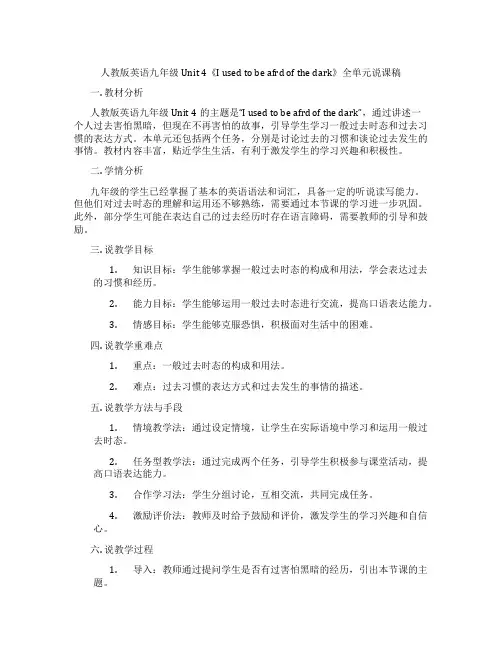
人教版英语九年级Unit 4《I used to be afrd of the dark》全单元说课稿一. 教材分析人教版英语九年级Unit 4的主题是“I used to be afrd of the dark”,通过讲述一个人过去害怕黑暗,但现在不再害怕的故事,引导学生学习一般过去时态和过去习惯的表达方式。
本单元还包括两个任务,分别是讨论过去的习惯和谈论过去发生的事情。
教材内容丰富,贴近学生生活,有利于激发学生的学习兴趣和积极性。
二. 学情分析九年级的学生已经掌握了基本的英语语法和词汇,具备一定的听说读写能力。
但他们对过去时态的理解和运用还不够熟练,需要通过本节课的学习进一步巩固。
此外,部分学生可能在表达自己的过去经历时存在语言障碍,需要教师的引导和鼓励。
三. 说教学目标1.知识目标:学生能够掌握一般过去时态的构成和用法,学会表达过去的习惯和经历。
2.能力目标:学生能够运用一般过去时态进行交流,提高口语表达能力。
3.情感目标:学生能够克服恐惧,积极面对生活中的困难。
四. 说教学重难点1.重点:一般过去时态的构成和用法。
2.难点:过去习惯的表达方式和过去发生的事情的描述。
五. 说教学方法与手段1.情境教学法:通过设定情境,让学生在实际语境中学习和运用一般过去时态。
2.任务型教学法:通过完成两个任务,引导学生积极参与课堂活动,提高口语表达能力。
3.合作学习法:学生分组讨论,互相交流,共同完成任务。
4.激励评价法:教师及时给予鼓励和评价,激发学生的学习兴趣和自信心。
六. 说教学过程1.导入:教师通过提问学生是否有过害怕黑暗的经历,引出本节课的主题。
2.新课呈现:教师通过讲解和示范,教授一般过去时态的构成和用法。
3.实践环节:学生分组讨论过去的习惯和经历,用一般过去时态进行交流。
4.任务一:学生分组完成第一个任务,讨论过去的习惯,并展示给其他小组。
5.任务二:学生分组完成第二个任务,谈论过去发生的事情,并展示给其他小组。
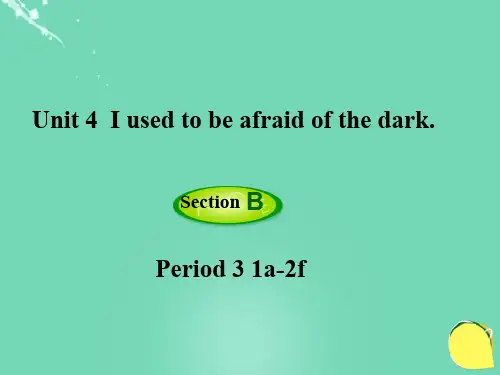
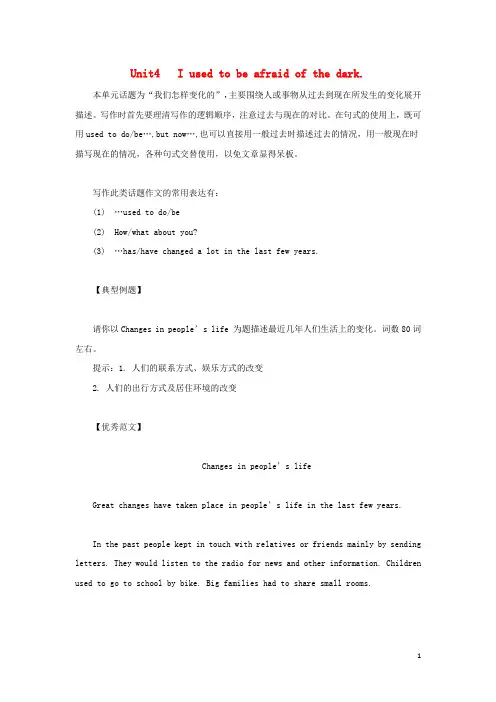
Unit4 I used to be afraid of the dark.本单元话题为“我们怎样变化的”,主要围绕人或事物从过去到现在所发生的变化展开描述。
写作时首先要理清写作的逻辑顺序,注意过去与现在的对比。
在句式的使用上,既可用used to do/be…,but now…,也可以直接用一般过去时描述过去的情况,用一般现在时描写现在的情况,各种句式交替使用,以免文章显得呆板。
写作此类话题作文的常用表达有:(1) …used to do/be(2) How/what about you?(3) …has/have changed a lot in the last few years.【典型例题】请你以Changes in people’s life 为题描述最近几年人们生活上的变化。
词数80词左右。
提示:1. 人们的联系方式、娱乐方式的改变2. 人们的出行方式及居住环境的改变【优秀范文】Changes in people’s lifeGreat changes have taken place in people’s life in the last few yea rs.In the past people kept in touch with relatives or friends mainly by sending letters. They would listen to the radio for news and other information. Children used to go to school by bike. Big families had to share small rooms.Now people can talk to others by telephone or on the internet at home. When they are free, they watch the news and other programs on TV. Some families are rich enough to send their children to school in their own cars. More and more people live in big and bright apartment with several rooms.In a word, people live better than before.。
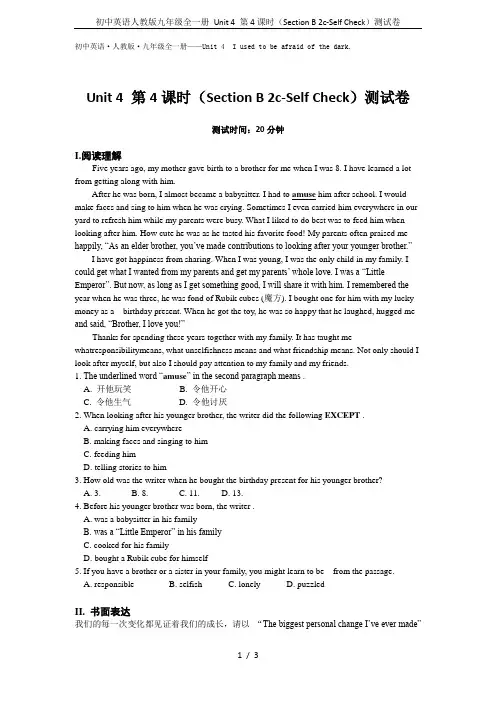
初中英语·人教版·九年级全一册——Unit 4 I used to be afraid of the dark.Unit 4 第4课时(Section B 2c-Self Check)测试卷测试时间:20分钟I.阅读理解Five years ago, my mother gave birth to a brother for me when I was 8. I have learned a lot from getting along with him.After he was born, I almost became a babysitter. I had to amuse him after school. I would make faces and sing to him when he was crying. Sometimes I even carried him everywhere in our yard to refresh him while my parents were busy. What I liked to do best was to feed him when looking after him. How cute he was as he tasted his favorite food! My parents often praised me happily, “As an elder brother, you’ve made contributions to looking after your younger brother.”I have got happiness from sharing. When I was young, I was the only child in my family. I could get what I wanted from my parents and get my parents’ whole love. I was a “LittleE mperor”. But now, as long as I get something good, I will share it with him. I remembered the year when he was three, he was fond of Rubik cubes (魔方). I bought one for him with my lucky money as a birthday present. When he got the toy, he was so happy that he laughed, hugged me and said, “Brother, I love you!”Thanks for spending these years together with my family. It has taught me whatresponsibilitymeans, what unselfishness means and what friendship means. Not only should I look after myself, but also I should pay attention to my family and my friends.1. The underlined word “amuse” in the second paragraph means .A. 开他玩笑B. 令他开心C. 令他生气D. 令他讨厌2. When looking after his younger brother, the writer did the following EXCEPT .A. carrying him everywhereB. making faces and singing to himC. feeding himD. telling stories to him3. How old was the writer when he bought the birthday present for his younger brother?A. 3.B. 8.C. 11.D. 13.4. Before his younger brother was born, the writer .A. was a babysitter in his familyB. was a “Little Emperor” in his familyC. cooked for his familyD. bought a Rubik cube for himself5. If you have a brother or a sister in your family, you might learn to be from the passage.A. responsibleB. selfishC. lonelyD. puzzledII. 书面表达我们的每一次变化都见证着我们的成长,请以“The biggest personal change I’ve ever made”为题,并根据要点和要求,用英语写一篇短文。

初三英语Unit-4-I-used-to-be-afraid-of-the-dark课文及详解Unit 4 I used to be afraid of the darkLanguage Goal:Talk about what you used to be likeSection A1a Fill in the chart with words to describe people. Appearance 外表Personality 个性Tall 高个的Outgoing 外向的straight hair 直发Funny 滑稽的,有趣的Yes, I did.used to和would①used to和would都可表示过去的习惯或行为,常可换用。
When we were children we used to/would go skating very winter. 我们小时候每年冬天都去滑冰。
②used to含有较强的“今昔对比”的含义I do not swim so often as I used to我不像过去那样常游泳了。
而used to则可无时间状语used to do和be used to doing.①be used to 是“习惯于”某一客观事实和状态,不强调动作,to是介词,后面接名词或动名词,I am used to the weather here.我已经习惯于这里的天气了。
He is used to hard work. 他习惯于艰苦的工作。
②get(或become)used to指的是从不习惯到习惯这一过程的转变,另外,它往往包含着克服困难去适应的意思。
如:You will soon get used to the weather here.你会习惯于这里的天气的。
In the end, I got used to doing the hard work.最后,我终于习惯干苦活了。
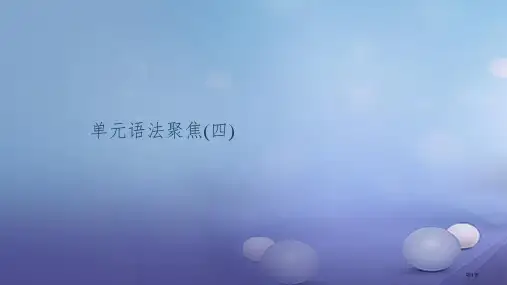

人教版英语九年级Unit 4《I used to be afrd of the dark》全单元教学设计一. 教材分析人教版英语九年级Unit 4的主题是“I used to be afrd of the dark”,主要讲述了人们过去和现在的变化。
本单元包括两个部分:Part A和Part B。
Part A包含一个听力任务、一个口语任务和三个阅读任务,而Part B包含一个口语任务、两个阅读任务和一个写作任务。
教材内容丰富,旨在提高学生听说读写四项基本技能,同时培养他们的文化意识和跨文化交流能力。
二. 学情分析九年级的学生已经具备了一定的英语基础,能够运用所学知识进行简单的交流。
但是,他们在词汇、语法和听力方面还存在一定的困难。
因此,在教学过程中,教师需要关注学生的个体差异,充分调动他们的学习积极性,激发他们的学习兴趣。
三. 教学目标1.知识目标:学生能够掌握本单元的重点词汇和语法知识,正确运用一般过去时描述过去和现在的变化。
2.能力目标:学生能够在不同情境下运用所学知识进行听说读写操作,提高他们的语言运用能力。
3.情感目标:学生能够了解并尊重文化差异,培养跨文化交流的能力。
四. 教学重难点1.重点:本单元的重点词汇和语法知识,以及一般过去时的运用。
2.难点:一般过去时的运用,以及如何在实际情境中进行跨文化交流。
五. 教学方法1.任务型教学法:通过完成各种任务,激发学生的学习兴趣,提高他们的实践能力。
2.情境教学法:创设真实的情境,帮助学生理解并运用所学知识。
3.交际法:鼓励学生积极参与课堂交流,提高他们的口头表达能力。
六. 教学准备1.教师准备:备好相关教学材料,如PPT、听力材料、阅读材料等。
2.学生准备:预习本单元内容,完成相关的自主学习任务。
七. 教学过程1.导入(5分钟)教师通过提问方式引导学生回顾上一单元学过的内容,激发学生的学习兴趣。
例如:“Do you remember what we learned in the last unit? How was your weekend?”2.呈现(10分钟)教师通过展示PPT或实物,呈现本节课的主题“I used to be afrd ofthe dark”,引导学生关注一般过去时的运用。
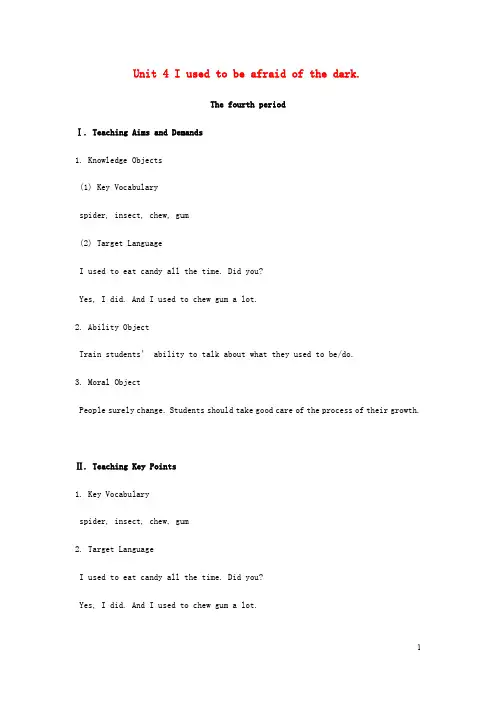
Unit 4 I used to be afraid of the dark.The fourth periodⅠ. Teaching Aims and Demands1. Knowledge Objects(1) Key Vocabularyspider, insect, chew, gum(2) Target LanguageI used to eat candy all the time. Did you?Yes, I did. And I used to chew gum a lot.2. Ability ObjectTrain students’ ability to talk about what they used to be/do.3. Moral ObjectPeople surely change. Students should take good care of the process of their growth.Ⅱ. Teaching Key Points1. Key Vocabularyspider, insect, chew, gum2. Target LanguageI used to eat candy all the time. Did you?Yes, I did. And I used to chew gum a lot.Ⅲ. Teaching Difficult PointTalk about what you used to be/do.Ⅳ. Teaching MethodPractice methodⅤ. Teaching Aids1. A tape recorder2. A picture with spiders and a picture with insects.3. A gumⅥ. Teaching ProceduresStep 1 RevisionCheck homework. Invite different students to report what his/her grandparents, parents, aunts, uncles, or old friends used to be afraid of when they were young. Step2 1aThis activity introduces new vocabulary words and provides practice with the target language.Using pictures, teach students to practice the words spider and insect. Teach the word gum by holding up a gum. And teach the verb chew by chewing the gum.Ask students to complete the work individually.Check the answers by inviting different students to report his/her work like this: When I was a child, I used to like painting pictures and singing in music class. Say each number to the class and ask students to raise their hands for each thing they used to like to do. Then discuss the results with the class.Step 31bThis activity provides practice with the target language.Point out the box under the pictures.Read the instructions to the class. Say,You are to write some other things that you used to like to do when you were a children on the lines in the box. Remind students to write sentences.As students work, move around the room offering language support and helping them with any words they want to use.Get a student to write his/her sentences on the blackboard. Help correct any errors. Sample answers1. I used to play football with my brother.2. I used to eat hamburgers a lot.3. I used to watch cartoons.4. I used to run with my father in the morning.Step 4 2a 2bThis activity provides listening practice using the target language.Set a time limit of one minute. Ask students to look through the sentences in thebox.Say, You will hear a boy and a girl talking about how life used to be when they were much younger on the recording. Listen and check the sentences you hear.Point out the sample answer. Play the recording for the first time. Students only listen.Play the recording again. This time students check the sentences they hear. Check the answers.AnswersChecked sentences: 1,2,3TapescriptGirl 1: My six-year-old brother started school this week.Boy 1: He’s really lucky. Life was great when I was six.Girl 1: Really? Why?Boy 1: Oh, schoolwork was really easy.Girl 1: Not for me. I didn’t use to like tests. Now I don’t worry about tests. Boy 1: And we used to play every day after school. Now we just study all the time. Girl 1: Yeah, but we used to walk to school. Now we have to take the bus.Boy 1: I remember one thing. I used to hate gym. Now I love gym class.Girl 1: Me, too.Step 5 2cThis activity provides oral practice using the target language.Ask a pair of students to read the sample conversation to the class.Optional activityAsk students to talk about good and bad habits. Then make sentences with “used to”to show which habits they have stopped and make sentences with “still” to show which ones they still have.Step 6 Summary and HomeworkSay, In this class, we’ve learned the new vocabulary words spider, insect, gum and chew and the target language I used to do sth. After class, finish writing the sentences in Optional Activity.The fifth periodStep 1 Fill in each blank with correct words givenStep 2 Use phrase “used to ” to write about Yu MeiStep 3 ReadingMartin Murray is a fifteen-year-old boy. He used to be a “problem child”,(1) . He didn’t use to give hismother many problems. However, after his father’s death a few years ago, Martin’s life became much more difficult. His mother couldn’t afford to pay for her child’s education. To do this, she had to work, and so was not often at home. His mother looked after him as well as she could.Unfortunately, Martin still cause d problems for himself and his family. He was not interested in studying, and he often got into trouble with the police.Luckily, his mother was very patient, (2) . Inthe end, she made a difficult decision: to send him to a boy’s boarding school.Martin hated it and used to cause a lot of trouble. One day, he told his teacherhe wanted to leave the school. (3) . The head teacher said it was necessary to talk with his mother. Martin called his mother, but to his surprise, this phone call changed his life. “It was exactly what I needed,” he said. “My mother helped me to understand how much she had given me. She also told me that even though my father was no longer with us, he was watching me, and would always take pride in everything good I do.(4) . I realize that since my father died,I have been afraid of being alone, and have tried to make my mother pay moreattention to me.” Now Martin has really changed. He has been working hard, and he is now a top student in his class. (5) . His mother’s love helped him to feel good about himself, and as Martin himself says, “It’s very important for parents to be there for their children.”Step 4 Homework。
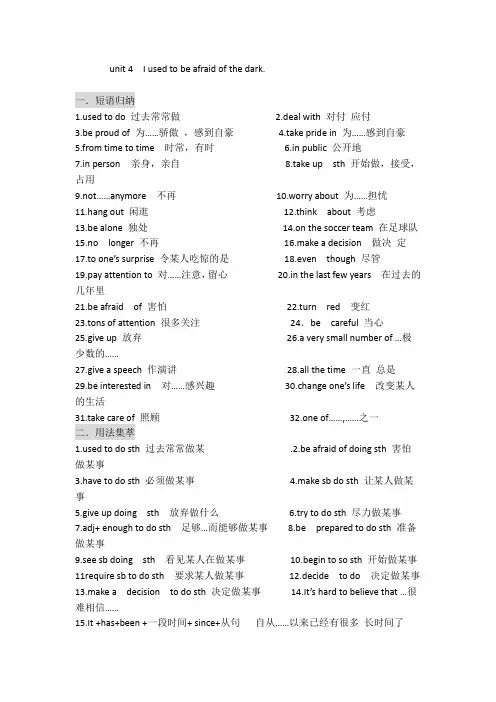
unit 4 I used to be afraid of the dark.一.短语归纳ed to do 过去常常做2.deal with 对付应付3.be proud of 为……骄傲,感到自豪4.take pride in 为……感到自豪5.from time to time 时常,有时6.in public 公开地7.in person 亲身,亲自8.take up sth 开始做,接受,占用9.not……anymore 不再10.worry about 为……担忧11.hang out 闲逛12.think about 考虑13.be alone 独处14.on the soccer team 在足球队15.no longer 不再16.make a decision 做决定17.to one’s surprise 令某人吃惊的是18.even though 尽管19.pay attention to 对……注意,留心20.in the last few years 在过去的几年里21.be afraid of 害怕22.turn red 变红23.tons of attention 很多关注24.be careful 当心25.give up 放弃26.a very small number of …极少数的……27.give a speech 作演讲28.all the time 一直总是29.be interested in 对……感兴趣30.change one’s life 改变某人的生活31.take care of 照顾32.one of……,……之一二.用法集萃ed to do sth 过去常常做某.2.be afraid of doing sth 害怕做某事3.have to do sth 必须做某事4.make sb do sth 让某人做某事5.give up doing sth 放弃做什么6.try to do sth 尽力做某事7.adj+ enough to do sth 足够…而能够做某事8.be prepared to do sth 准备做某事9.see sb doing sth 看见某人在做某事10.begin to so sth 开始做某事11require sb to do sth 要求某人做某事12.decide to do 决定做某事13.make a decision to do sth 决定做某事14.It’s hard to believe that …很难相信……15.It +has+been +一段时间+ since+从句自从……以来已经有很多长时间了16.dare to do sth 敢于做某事17.It’s adj+ for sb+ to do sth对某人来说做某18.take up doing sth 开始做某事三.语法全解1. 辨析:used to do sth. 过去常常做…get/be used to sth./doing sth. 习惯于…be used to do 被用于做…(被动语态)be used by 由(被)…使用(被动语态)be used as … 被当做…使用(被动语态)be used for doing被用于做…(被动语态)例: I used to go to work by bus. Now I take a taxi.He used to be a problem boy. She used to be very shy.I’m used to drinking a cup of water after meal.He’s been used to living in the dormitory.A hammer is used to drive nails.This machine is used to clean the floor.The girl is being used as a servant in the house.A knife can be used for cutting bread.2) afford(支付得起)的用法afford sth 买得起…… afford t o do sth 有足够的…去做…例:His mother couldn’t afford to pay for her child’s education.They did not consider whether they could afford the time or not.We can’t afford to pay such a price. (such和so区别见P110)3) take pride in sth/ sb = be proud of sth/ sb 为…感到自豪例:He was watching me and take pride in everything good I do.I take pride in my child. =I’m proud of my child.注:He take pride in everything good I do. 这是一个定语从句。
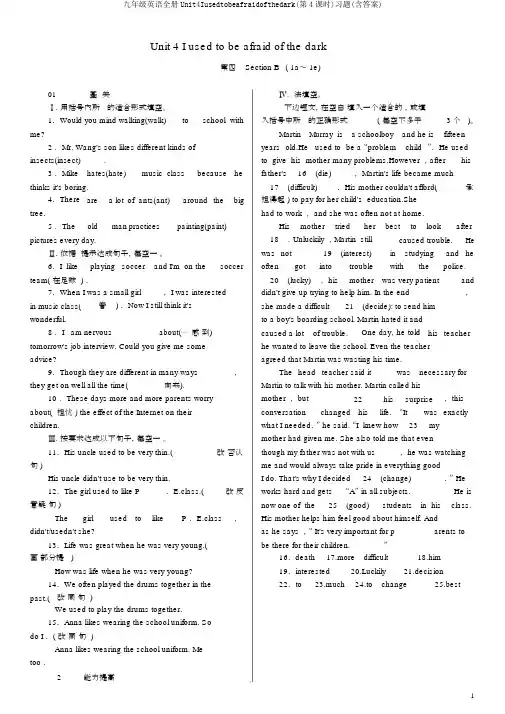
九年级英语全册Unit4Iusedtobeafraidofthedark(第4课时)习题(含答案)Unit 4 I used to be afraid of the dark第四Section B( 1a~ 1e)01基关Ⅳ. 法填空。
Ⅰ. 用括号内所的适合形式填空。
下边短文,在空白填入一个适合的,或填1. Would you mind walking(walk)to school with入括号中所的正确形式( 每空不多于3个 )。
me?Martin Murray is a schoolboy and he is fifteen2 . Mr. Wang's son likes different kinds of years old.He used to be a “problem child”. He used insects(insect).to give his mother many problems.However ,after his3 . Mike hates(hate)music class because he father's __16__(die), Martin's life became much thinks it's boring.__17__(difficult). His mother couldn't afford(承4. There are a lot of ants(ant)around the big担得起 ) to pay for her child's education.Shetree.had to work , and she was often not at home.5 . The old man practices painting(paint)His mother tried her best to look after pictures every day.__18__.Unluckily ,Martin still caused trouble.He Ⅱ. 依据提示达成句子,每空一。
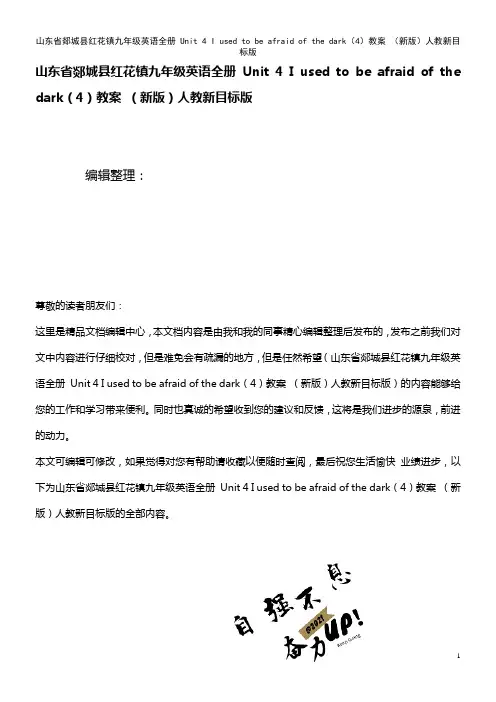
山东省郯城县红花镇九年级英语全册Unit 4 I used to be afraid of the dark(4)教案(新版)人教新目标版编辑整理:尊敬的读者朋友们:这里是精品文档编辑中心,本文档内容是由我和我的同事精心编辑整理后发布的,发布之前我们对文中内容进行仔细校对,但是难免会有疏漏的地方,但是任然希望(山东省郯城县红花镇九年级英语全册Unit 4 I used to be afraid of the dark(4)教案(新版)人教新目标版)的内容能够给您的工作和学习带来便利。
同时也真诚的希望收到您的建议和反馈,这将是我们进步的源泉,前进的动力。
本文可编辑可修改,如果觉得对您有帮助请收藏以便随时查阅,最后祝您生活愉快业绩进步,以下为山东省郯城县红花镇九年级英语全册Unit 4 I used to be afraid of the dark(4)教案(新版)人教新目标版的全部内容。
Unit 4 I used to be afraid of the dark课题Unit 4 I used to be afraid of the dark。
课型New教学目标Be able to read the text fluently.1.Target Language.2。
Practice reading and writing using the 教学重点target language.3. Talk about what you used to be/do。
1.Target Language.2。
Practice reading and writing using the 教学难点target language.3. Talk about what you used to be/do.教学设计学生活教师活动动Step 1 RevisionReview the target language presented in this unit. Invite a student to come to the front of the classroom and demonstrate an activity。
Unit 4练习题一、单项选择(10分)( ) 1. I am used to _____ a T-shirt and jeans.A. wearB. put onC. wearingD. putting on( ) 2. Tina used to ________ to work, but she is used to ________ to work now.A. riding a bike, taking a busB. riding a bike, take a busC. ride a bike, taking a busD. ride a bike, take a bus( ) 3. Yao Ming ______ all over the world.A. knowsB. knewC. is knownD. was known( ) 4. — Do you often clean your classroom?— Yes. Our classroom _______ every day.A. cleanB. cleansC. is cleanedD. is cleaning( ) used to go shopping together, ________?A.didn‘t they B.weren't they C.did they D.used they( ) 6. — Is Yi Jianlian ________ NBA player?— He used to t now he plays for Guangdong Southern Tigers in CBA.A. aB. anC. theD. \( ) 7. —Why don’t you buy a camera?— Do you think I need to? My phone is often used ________ a camera.A. byB. forC. asD. with( ) 8. To plantime better, you can make a ________ of the things you need to do first.A. listB. projectC. numberD. lot( ) 9. — Was table tennis invented by the Chinese?— No. It ________ in China until the start of the 20th century.A. playedB. was playedC. didn’t playD. wasn’t played( ) 10. — Can we pick some oranges to eat?—Can’t you see that they are green? They must be ________.A. sweetB. saltyC. hotD. sour二、完型填空(15分)Pets are part of people’s life. If you are like most people 11 have pets, you care for them as if they were your children. Meeting their needs is a(n) 12 part of your day, because you want them to have everything they need. One thing they need but cannot tell you about is 13 .Many pet 14 on animals’ music because this helps their pets to feel 15 when they are gone. Most people are 16 throughout the day, leaving their pets 17 at home. To make your pets feel comfortable and safe, you could try putting on music before you 18 the house.You mige to 19 music to see what type works for your pet. If you just want to keep your pet calm, you will need to play 20 music instead of rock or hip-hop music, which might 21 your pet.Also, ed to know that different pets act 22 to music. Hard rock music has also been found to work 23 to calm some pets, as well as piano music.24 piano music works well on most animals, it works best on cats.Playing musicso a great idea for people with 25 pets. They can have such a difficult time getting used to their new environment that they need all the help.( )11. A. which B. who C. whom D. whose( )12. A. small B. difficult C. important D. unimportant( )13. A. food B. money C. music D. interest( )14. A. owners B. scientists C. shops D. projects( )15. A. sadder B. angrier C. worse D. better( )16. A. at work B. at home C. at the door D. at the church( )17. A. aloud B. awake C. alone D. asleep( )18. A. buy B. leave C. build D. clean up( )19. A. change B. make C. write D. listen to( )20. A. noisy B. hard C. loud D. soft( )21. A. interest B. annoy C. worry D. entertain( )22. A. bravely B. correctly C. differently D. the same( )23. A. badly B. well C. hard D. closely( )24. A. Though B. Until C. Because D. Since( )25. A. big B. old C. little D. new三、阅读理解(40分)AThe best way of learning a language is using it .The best way of learning English is talking in English as much as possible. Sometimes you’ll get your words mixed up ( 混合)and people will not understand you .Sometimes people will say things too quickly and you can’t understand them. But if you keep your sense of humor (幽默感),you can always have a good laugh at the mistakes you make. Don’t be unhappy if people seem to be laughing at your mistakes. It is better for people to laugh at your mistakes than to be angry with you. because they don’t understand what you are saying .The most important thing for learning English is : “Don’t be afraid of making mistakes because everyone makes mistakes. ”( ) does the writer think that the best way for you to learn a language?A. WritingB. Using itC. ListeningD. Learning grammar( ) 2. What should you do in learning English?A. Be careful not to make any mistakes . B .Write as quickly as you can .C .Speak English as much as you can.D .Laugh more often .( ) 3. When people laugh at your mistakes, what should you do?A. Not mind.B. Be happy.C. Feel worried.D. Be unhappy.( ) 4. When you make a mistake, what should you do?A. Keep quiet.B. Get angry.C. Be kind.D. Keep your sense of humor.( ) does the story tell us?A. Only foolish people make mistakes.B. Few people make mistakes.C. People never make mistakes. D .There is no one who doesn’t make mistakes.BA frog (青蛙) is born in a small river. When he is young, the river is his home. He doesn’t know his parents, but he has hundreds of brothers and sisters. He swims about and plays all day with them. At that time, he doesn’t look like his parents. He has no legs, but he has a long tail. So he looks like a fish.Then his tail gets shorter and shorter. And he has four legs and a very short tail. He looks like his parents now. Then he’s going to eat a lot of insects(昆虫)– a lot of bad insects.()6. Where is a frog born?A. In a holeB. On the landC. On a treeD. In a river()7. What does a baby frog look like?A. L ooks like his parents, but he doesn’t know them.B. Looks like a fish and he knows his parents.C. Looks like a fish and he has hundreds of brothers and sisters.D. Has a long tail and four legs.()8. Whom does a baby frog play with?A. Plays all day with his parents.B. Plays all day on the land.C. Swims around and plays all day by himself.D. Plays with his brothers and sisters in the river.()9. What does a mother frog look like?A. Its legs are short but its tail is long.B. It has four legs and a very short tail.C. It has no tail .D. It has two legs and a long tail()of the following sentences is TRUE?A. likes his parents, can’t eat a lot of insectsB. dislikes his parents, can eat a lot of insectsC. likes his parents, can eat a lot of bad insectsD. likes his parents, can eat a lot of fliesCA father isn’t happy with his only son. He doesn’t think his son is clever.One day, the father gives his son a task. He says, here is a coin. Go to buy one thing. That must be something to eat, something to drink, and something to plant.“What can I buy with one coin? It is too hard!”Then a girl finds the boy is not happy and comes up to him. “Can I help you? ”The boy tells her that hard task. “I know what you can do, ”she says. “Go and buy a watermelon with this coin. ”It will give you everything your father wants.”The boy thanks the girl and then runs to buy a watermelon.When the father sees the watermelon, he is very happy. “Good Job!”“In fact, that’s not my idea. A girl helps me”, says the boy. The father then says, “Honesty is more important than cleverness.”( ) 11. Why isn’t the father happy?A. He doesn't think his son is clever.B. His son is lazy.C. His son doesn’t study hard.D. His son can’t buy something for him.( ) 12. What does the boy think about what his father says?A. Where to buy it.B. What to buy.C. How to buy it.D. Why to buy it.( ) 13. Who helps the boy?A. A girl.B. An old man.C. A friend.D. A teacher.( )14. How does the father feel when he sees the watermelon?A. SadB. HappyC. SurprisedD. Angry( ) 15 .What is the meaning of “honesty”in Chinese?A. 失败B. 坚持C. 诚实D. 骄傲DThe size and shape of your ears show your character more than any other parts of the face. Other parts of the face change shape as we get older, but ears do not change their shape. They only change in size.Reading people’s character from their ears is an old science. In very old times people thought that a person with big ears had a good and generous character. They thought that a person with pale (nearly white), small ears was dangerous. They also thought that the shape of the ear showed whether a person was musical or not. Today, too, many people believe that the size and the shape of the ear help you know if a person is musical.Ears are all different, and each characteristic has a meaning. Next time when you look at a person, see if his ears are large or small. Look at the lobes( the lowest part of the ear). Are they attached(连着) to the face? Ears that are always red mean a person may easily get angry, or he/she just has high blood pressure(高血压). Ears that are always cold and pale mean a person has a nervous character. And a big inside hole of the ear means a person is musical.( ) 16 What might in the old times people ask for help from a person with?A. Red ears.B. Big ears.C. Small ears.D. Pale ears.( ) 17. What is the passage mainly about?A. the size of our earsB. musical earsC. ears which related to charactersD. our faces and ears( ) do we know change shape as we get older from the passage?A. earsB. hairC. eyesD. teeth( ) 19. What can we guess Beethoven may have?A. pale earsB. white earsC. small earsD. ears with a big inside hole( ) 20., What may you find the ears of your teacher if you are often late for school?A. get biggerB. get smallerC. get colderD. get redder四、补全对话(5分)Tom: What are you going to be after leaving school?Bill: I’m thinking about becoming a pilot. I like planes very______1______.Tom: So you like traveling, don’t you?Bill: Of course, I do. I like to____2____different places., make different friends and know different things.Tom: That sounds good. But I would rather live in our place.Bill: What do you want to be in the future?Tom: _____3____I’ll be a businessman. I like to go into business and make money.Bill: Business people are very ____4_____, you know.Tom: You’re right. But I’m always thinking “busy” is ____5____ than “free”.五、选词填空(10分)根据短文内容,在短文后的空格处选填一个恰当的词,使短文完整、通顺。